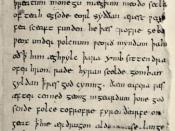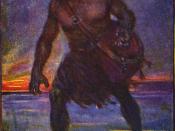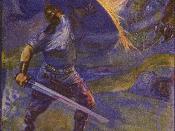"The cynic is one who never sees a good quality in a man, and never fails to see a bad one. He is a human owl, vigilant in darkness, and blind to light, mousing for vermin, and never seeing noble game" (Henry Beecher). In John Gardner's novel Grendel, a modern twist on the epic poem Beowulf, the Dragon epitomizes this definition of cynicism. Mr. Dragon harbors scorn towards his "inferiors" and therefore uses mockery and sarcasm to ridicule them.
Mr. Dragon shows contempt and disdain towards creatures he finds despicable and trivial. This scornful attitude reveals itself when Grendel says, "[the dragon] laughed, spoke, and broke my fall not as a kindness to me but because of his cold pleasure in knowing what he knew" (62). The Dragon realizes that his ability to see into the future and read minds makes him superior, and therefore gets "cold pleasure" from being able to read vulnerable creature's minds.
He uses this gift to taunt others and make them feel inferior. Mr. Dragon tells Grendel, "You now, you see the past and the present like other low creatures" (62). He not only rubs it in that Grendel does not posses his omniscience, but also uses the condescending word low. The Dragon constantly uses such terms with Grendel, and particularly when describing humans. He patronizes humans as "lower minds" (66), and mere "theory-makers" (64) and views them as pests. The Dragon scorns the people's beliefs and their "intellect", which presents itself when Mr. Dragon tells Grendel, "[the humans] only think that they think" (64). He further looks down upon the human's minds when he describes the impact of the scopes powerful "lies" on the people and says, "as for myself, I can hardly bear to look" (65). Mr. Dragon sees...


